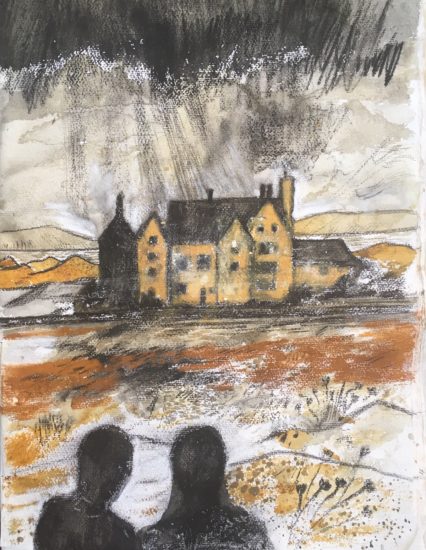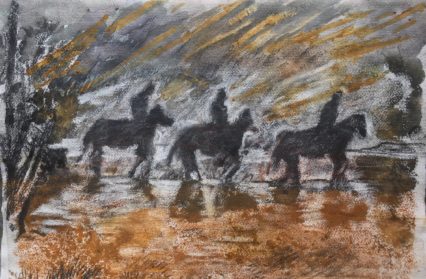Award-winning writer Robert Minhinnick writes about the creation of his latest book, The Dunes, a collaboration with artist Dan Llywelyn Hall.
For centuries the Merthyr Mawr Warren dune system in South Wales – the second largest dunes in western Europe – has been a source of much fascination for historians, archaeologists and ecologists alike. The buried city of Kenfig lies beneath many meters of sand that swept across the coastline in the 15th century consuming miles of a thriving city and hamlets.
Until now, very little of its landscape has been explored in the visual arts and poetry. The
diverse flora and fauna and the few historical fragments that poke out the sand have been a
preoccupation for a local poet and artist whose mission is to draw world’s attention to its
existence.
Robert Minhinnick has lived close to the Merthyr Mawr sand dunes near Porthcawl for many years. The selection of poems included in this volume is based on the duneland areas between the mouths of the rivers Ogwr and Cynffig. Artist, Dan Llywelyn Hall grew up in south Wales between Barry and Porthcawl. His father would frequently take him on walks across the dunes of Merthyr Mawr, relaying its stories. His drawings explore his finds and imagined city beneath the sand.
Gradually, my life is filling with sand. Yes, sand, mercurial and duplicitous. Every grain unique.
I know sand has already buried my writing. And maybe this is no bad thing. Sand reflects where I live, and a culture I have inherited and attempt to develop. I’m confident enough to believe that both life and work will emerge from that dune I am constructing around them.
It was 2018 when artist, Dan Llywelyn Hall approached me about a possible collaborative work based on the duneland near Porthcawl. We were both appearing at the innovative ‘Between the Trees’ festival, in Merthyr Mawr, occurring again this year, August 30/September 1.
 It was agreed that we would combine my poetry and prose with Dan’s painting and drawing, in an attempt to do justice to our shared sand dune geography.
It was agreed that we would combine my poetry and prose with Dan’s painting and drawing, in an attempt to do justice to our shared sand dune geography.
Everything I write about in The Dunes has been personally experienced. Yes, I am a regular trespasser in the sands, exploring an imaginary world, made elemental by its flora and fauna.
The first poems in ‘The Dunes’ were ignited by encounters with orchids, lizards and vipers. More recent writings combine the creatures I meet in the sand with musings on my relationship with my mother.
Also, I use my father’s 1945 wartime diary, kept in India and Burma, comparing entries made by Albert Minhinnick with events in my own life, noted on the same dates.
In addition, I use other personal experiences I find relevant. Therefore Babylon and the Iraqi dictator, Saddam Hussein, appear. For me these are as important as John Leland, perhaps the first person to write about this area of Wales, circa 1540.
Decima Minhinnick is now 93, sharing her care home with her younger sister. Both are paranoid schizophrenics, a condition – terrifying and exhausting – that has had an immense effect in the lives of my twin sister and myself.
The poem ‘Feeding Porridge to my Mother and talking about the Deer’ concerns early May 2019, and the effects of ‘Storm Hannah’ on Porthcawl.
Am I a dutiful son? At 66, I am what I am. But then, I used to be a ‘young poet’ and then a ‘young writer’. A wonderful fact is that Decima continues to enquire about my writing. For her, I am still that ‘young poet’, even as I take her great grandchildren to her bedside and they play with her teddy bears. Maybe one day those bears will loom out of the sand in a poem for ‘The Dunes’.
One of my fragments for the collection runs thus:
Black Rocks
Vague light.
As if my glasses
were left out overnight.
Yet the path home unmistakable
as the curlew
calling curfew.
The collection also contains thoughts on the nomenclature of dunes and pools in this eroded sand- and sea-scape. These are powerful lenses into its past, and maybe its future.
For me, the place names discoverable on OS maps of ‘the dunes’ are as vulnerable as every aspect of their natural history. Included in the volume is an experimental piece titled ‘Unrecorded: On the Set of Lawrence of Arabia in Tom Briton’s Country SS 85552 77080’, taken from a film by Peter Morgan.
For me, this project resembles sand itself, unstable, even untrustworthy. I know it can never be finished, and will continue throughout my life. Hopefully, it will also include film.
I am grateful to Dan Llywelyn Hall for his idea of this collaboration.
Between The Trees Festival,
Candleston Campsite, Merthyr Mawr, South Wales
https://betweenthetrees.co.uk/
Saturday 31 August.













